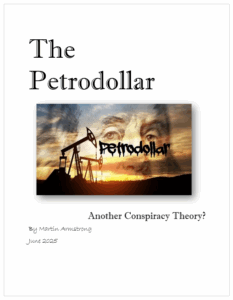The Truth About the Petrodollar: Dispelling Myths and Exploring Realities

Understanding the Petrodollar Phenomenon
"Is the strength of the U.S. dollar really tied to oil?" This question arises frequently in discussions about global economics and often garners mixed opinions. At Extreme Investor Network, we believe it’s essential to dissect these claims and provide readers with a deeper understanding.
Historical Context
The concept of the "petrodollar" emerged post-1971 when the U.S. dollar was decoupled from gold. The U.S. struck an agreement with Saudi Arabia, essentially requiring oil sales to be conducted in dollars. This solidified the dollar’s role as the world’s primary reserve currency.
However, many see the petrodollar as more of a convenient theory rather than a cornerstone of global economics. Indeed, former President Trump’s recent trip to Saudi Arabia stirred the pot, with some dubbing it "Petrodollar 2.0." But does it truly hold water?
The Numbers Speak
Data from 2022 indicates that oil and petroleum products account for approximately 8-10% of global trade, amounting to around $2.2 to $2.5 trillion. OPEC’s contribution is about 40% of the crude market, primarily from key players like Saudi Arabia, Russia, and the U.S.
Consider: if we filter out OPEC’s contributions, we are left with a more manageable figure—around $1 trillion. Saudi Arabia alone typically exports 6.5–7.5 million barrels per day, translating to an estimated $211 billion in oil revenues for 2023. In the grand tapestry of global merchandise trade, this barely scratches the surface, making Saudi oil sales just 0.0084% of total world trade.

Debunking Conspiracy Theories
It’s easy to get swept into the notion that oil sales dictate the strength of the dollar. Some assert that a shift toward pricing oil in foreign currencies, like the Chinese yuan, would disrupt the U.S. economy. However, history unfolds differently. The global dependency on the dollar remains significant, and changing pricing structures would not instantaneously alter the landscape of international finance.
As our insights reveal, the persistent narrative of "dollar doomsday," which has plagued analysts since the 1970s, only thrives on a lack of understanding of global investment flows.
The Bigger Picture
At Extreme Investor Network, we leverage our extensive knowledge and firsthand experience, having navigated the intricate world of OPEC finances and international trade. Having actively participated in high-level discussions surrounding oil market dynamics, we caution against oversimplified theories that neglect the interconnected complexities of modern economies.
What Lies Ahead?
As we look to the future, it’s crucial to stay informed and avoid falling prey to sensationalized narratives. The economic landscape continues to evolve, influenced by numerous factors beyond mere oil sales.
We invite you to join the conversation and explore these topics further. The petrodollar is a complex subject that warrants nuanced discussion rather than oversimplified interpretations. Here at Extreme Investor Network, we aim to challenge conventional wisdom, guiding our readers through the intricate web of global finance with expert insights and unique perspectives.
Conclusion
The petrodollar theory as a pillar of dollar strength is not simply a conspiracy theory but rather a complicated tale of history, economics, and geopolitics. As the world continues to change, understanding these dynamics is pivotal to navigating the future of investment and economics successfully.
Stay tuned for more detailed analyses and expert insights right here at Extreme Investor Network. Your journey towards financial literacy and informed investing starts with us.
Engage with us, share your thoughts, and let’s unravel this intricate web of economics together!

